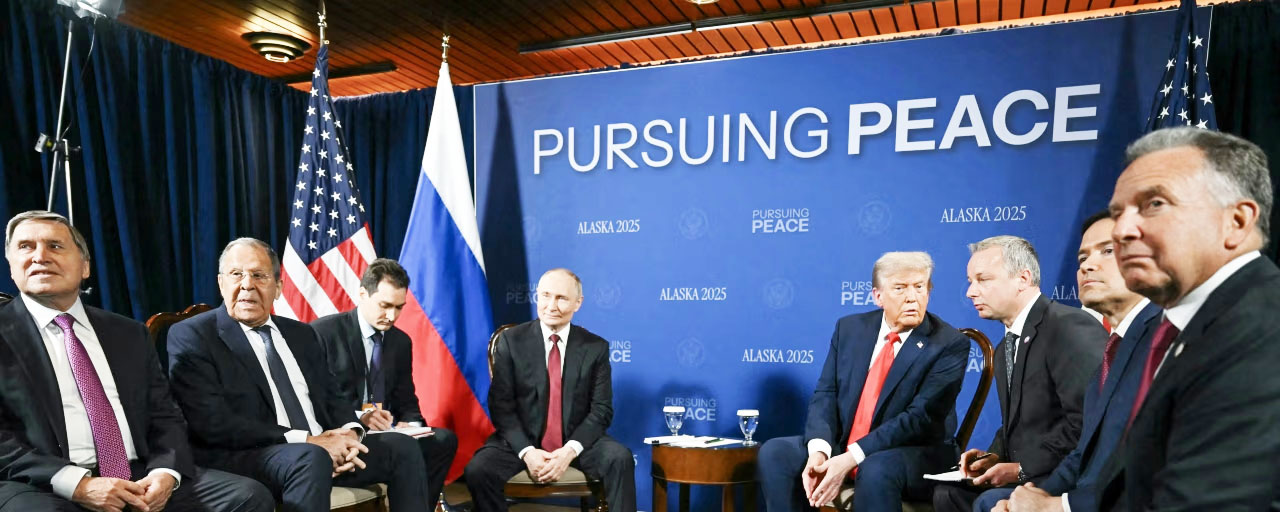Illusion of Peace


What transpired on August 15, 2025, amidst the cold Alaskan winds and in the corridors of power in Washington D.C., was not conventional diplomacy; it was a carefully orchestrated performance. Shrouded in secrecy, the summits between Donald Trump and Vladimir Putin created the illusion of a peace process that was far from reality. Trump's over-ambitious 'shuttle diplomacy,' driven by his personal legacy and a desire for a Nobel Peace Prize, has generated a diplomatic mirage that, instead of resolving the core issues of the conflict, has primarily served Vladimir Putin's long-term strategic objectives. This analysis explores how Trump's transactional style, Putin's patient strategy, and Zelensky's constrained position have together created a complex equation where talk of peace abounds, yet the prospects of a prolonged war have become even stronger. This was not merely a meeting of two presidents, but a high-stakes geopolitical game being played out between a dealmaker, a strategist, and a survivor.
The Dealmaker vs. The Strategist
At the heart of this diplomatic drama are leaders with starkly different worldviews and operating styles, and this asymmetry is shaping the outcomes of the process.
Donald Trump: The Dealmaker President
For Trump, the Ukraine war is not a complex historical struggle for national existence but a real estate deal that can be closed at the right price. His diplomacy is transactional, where everything has a cost. His goal is a quick, tangible, and headline-grabbing 'peace agreement' that he can present as his greatest achievement before the Nobel Prize announcements on October 10. His language is replete with terms like 'deal,' 'agreement,' and 'rapprochement.' He has simplified the conflict's most complex issues—'land' and 'security'—as if it were a matter of asset division between two companies. His sudden shift from emphasizing a ceasefire to a full peace agreement symbolizes this haste. He wants an outcome he can sell, no matter how shaky its foundations.
Vladimir Putin: The Patient Strategist
On the other hand, Vladimir Putin operates like a chess player, thinking several moves ahead. He perfectly understands Trump's personal ambitions and impatience and is exploiting them to his advantage. For Putin, time is no constraint; he faces no electoral pressure nor significant domestic opposition. He knows that Trump's presidency is a 'once-in-a-lifetime opportunity' for Russia to reset relations with the US on its own terms. Therefore, he is offering small, reversible concessions—such as proposing joint projects in the Arctic or allowing Exxon Mobil to return to the Sakhalin-1 project—to keep Trump engaged and feeling 'victorious.' These are low-cost investments, in exchange for which he seeks a much larger prize: US acceptance of Russian dominance over Ukraine and the avoidance of new sanctions, in which he has already succeeded.
This imbalance—Trump's urgency versus Putin's patience—is the pivot of this entire process, which Putin is skillfully turning to his advantage.
Two Impossible Equations
Trump's diplomacy rests on two pillars that are inherently contradictory: 'land swap' and 'security guarantees.' The meaning of these terms is so different for both sides that any middle ground is almost impossible.
The Land Swap
US Special Envoy Steve Witkoff called it the 'centerpiece of the deal,' but this is no simple transaction. For Ukraine, Luhansk, Donetsk, Zaporizhzhia, Kherson, and Crimea are not mere parcels of land but symbols of national sovereignty, identity, and thousands of sacrifices. Ceding these territories to Russia would be political suicide for President Zelensky and a betrayal of the national resolve that has withstood Russian aggression for over two years. Ukraine's constitution also makes any such transfer almost impossible.
For Russia, these territories are strategic assets and bargaining chips. Putin has hardened his stance by integrating these regions into Russia's constitution. He is using his battlefield gains to pressure Ukraine, signaling that if Kyiv does not accept his terms, it stands to lose even more territory. Thus, 'land' is an issue where neither side has flexibility, making it the biggest impediment to peace.
Security Guarantees
This second pillar is equally unstable. When Ukraine and Europe speak of 'security guarantees,' they mean 'NATO Article 5-like protection'—a credible military commitment that future Russian aggression will be met collectively. Without this, any peace agreement would merely be a temporary ceasefire.
But for Putin, 'security guarantees' mean precisely the opposite: Ukraine's complete demilitarization and permanent neutrality. He desires a Ukraine that can never join Western alliances and poses no threat to Russia. In this context, Trump's approach is extremely vague and ineffective. He talks of selling weapons to Ukraine but refuses to deploy US troops. This position neither provides Ukraine with genuine security nor is it acceptable to Putin, as it keeps Ukraine militarily capable.
Thus, Trump's diplomacy is trapped between these two fundamentally incompatible concepts, rendering any meaningful progress impossible.
The Price of the Performance
The biggest beneficiary of this diplomatic performance has been Russia. Putin has secured several significant gains without making any major strategic concessions:
Break in International Isolation: High-level summit talks with a US president have re-established Putin as a key player on the global stage, undermining Western efforts to isolate him.
Shifting Terms of Negotiation: Putin has successfully shifted the discourse from Ukraine's demands (immediate ceasefire and Russian troop withdrawal) to his preferred terms (a comprehensive peace agreement that legitimizes Russia's territorial gains).
Cracks in Western Unity: Trump's unilateral approach marginalizes European allies, who have a much more direct stake in this conflict than the US. This creates fissures within the Western alliance, which has always been a primary goal for Putin.
This entire process is creating a situation where Zelensky is under increasing pressure to accept an impossible peace deal, while Putin gains more time to consolidate his position.
Conclusion
Donald Trump's 'shuttle diplomacy' in Ukraine may be a bold and ambitious endeavor, but it is built on deeply flawed foundations. It disregards the historical complexities of the conflict, fails to understand the fundamentally different motivations of the key players, and sacrifices long-term stability for a quick personal win.
The fundamental disagreements between Russia and Ukraine are so profound that they cannot be resolved by the charisma of a summit. Neither the US nor Europe possesses sufficient leverage to force Russia to accept their terms, nor has Russia fully succeeded in subjugating Ukraine. Amidst this stalemate, Trump's diplomacy is creating a diplomatic fog that obscures the harsh reality: this war is destined to be a long and grueling struggle. Any hope for peace, unless it is based on realities on the ground, will prove to be a mirage—an illusion woven by one leader's hunger for legacy and another's strategic cunning.